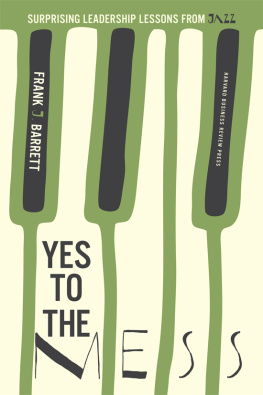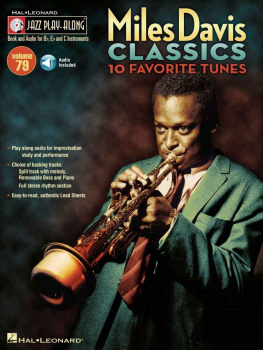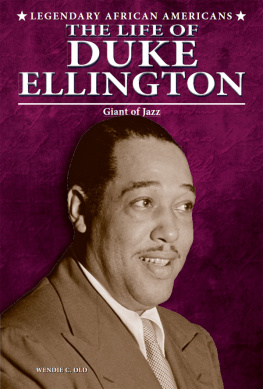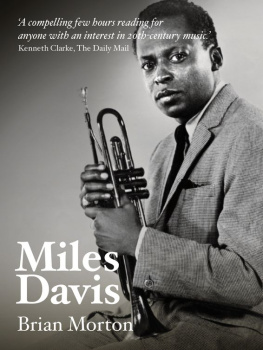Praise for Yes to the Mess
Finally! A book that applies the tools of an improvising jazz musician to great leadership. The modern world can no longer afford the orchestral model of managementlots of people playing the same part and a leader who stands apart from it all. The new world is premised on intense communication, lightning-speed decision making, risk taking, and a degree of perfected competence that allows spontaneous and brilliant composingnamely jazz. Yes to the Mess gets it right.
Roger H. Brown, President, Berklee College of Music; cofounder, Bright Horizons
With the velvety tones of Wes Montgomery and the wail of Miles Davis, professional jazz musician and management scholar Frank Barrett plays a set to enchant us. Pour a glass of wine, sit back, and listen to this engaging story of how to help teams and organizations innovate instead of replicate.
Richard Boyatzis, Distinguished University Professor, Case Western Reserve University; coauthor, Primal Leadership and Resonant Leadership
Ive known Frank Barrett for over thirty years, and weve often discussed the strange confluence of learned experience and pure intuition that exists in jazz improvisation. Frank gives us an insight into that world and how its lessons can be applied to almost any walk of lifetruly fascinating!
Ken Peplowski, jazz musician
YES
TO
THE
MESS
Surprising Leadership Lessons from Jazz
Frank J. Barrett
HARVARD BUSINESS REVIEW PRESS
BOSTON, MASSACHUSETTS
Copyright 2012 Frank J. Barrett
All rights reserved
Printed in the United States of America
10 9 8 7 6 5 4 3 2 1
No part of this publication may be reproduced, stored in or introduced into a retrieval system, or transmitted, in any form, or by any means (electronic, mechanical, photocopying, recording, or otherwise), without the prior permission of the publisher. Requests for permission should be directed to , or mailed to Permissions, Harvard Business School Publishing, 60 Harvard Way, Boston, Massachusetts 02163.
Library of Congress Cataloging-in-Publication Data
Barrett, Frank.
Yes to the mess : surprising leadership lessons from jazz / Frank Barrett.
p. cm.
ISBN 978-1-4221-6110-4 (alk. paper)
1. Leadership. 2. Creative ability. I. Title.
HD57.7.B37 2012
658.4092dc23
2012013504
This book is dedicated to two people.
First to my mother, Mary Hagan Barrett, who listened to me practicing the piano for years, witnessed me suffering through several clunkers, miscalculations, and wanderings (musical and otherwise), but always saw my potential better than I could myself. She is still the most resilient person I have ever known and has modeled what it means to continually say yes.
This book is also dedicated to my late friend, mentor, and colleague, W. Barnett Pearce. Barnett was a continual source of friendship, inspiration, and good humor. I wish he were here to hold this book in his hands and see how his influence continues to grow.
PREFACE
I wake to sleep, and take my waking slow.
I learn by going where I have to go.
Theodore Roethke, The Waking
On the surface this is a book about jazz improvisation. But relatively few of you who are reading these words are musicians, and many may not even like jazz musicalthough I hope that one consequence (not entirely unintended) of reading this book will be a deeper appreciation of jazz. This is really a book about the leadership mind-set and the kinds of activities and skills that help leaders understand and facilitate the innovation process.
My own path may seem improvisational, or accidental. In the late 1980s when I was a graduate student in Organizational Behavior at Case Western Reserve University, I was at a conference where my dissertation advisor, Suresh Srivastva, introduced me to Karl Weick as the doctoral student who used to play jazz. I remember two things from this encounter. First, I couldnt believe that I was really standing in front of, let alone talking to, Karl Weick. I and my fellow graduate students held his ideas in the highest esteem, and he had achieved, in our minds, pantheon status. The second thing I remember is what Karl said to me after Suresh told him of my former career as a jazz musician. Karl asked Are you writing your dissertation about jazz as an innovative organization? I mumbled an answer I dont recall now, but I remember thinking Huh? What does jazz improvisation have to do with organizational behavior? In fact I was well into my dissertation at the time and would graduate soon after, but Karls question continued to echo, and I eventually began to see the connection that now seems so obvious. In the words of Theodore Roethke cited above, I was waking slowly.
I became increasingly intrigued with exploring the connection between my two passionsjazz and organizational behavior. In August 1995 at the Academy of Management in Vancouver, British Columbia, I partnered with Mary Jo Hatch to design and facilitate a lecture session and panel discussion on Jazz Improvisation and Organizational Complexity. Karl Weick was part of that panel. The papers that I and other participants wrote for this session were published in a special issue of Organization Science that appeared in 1998. Both the Vancouver session and the special journal issue further seeded my interest in the topic of improvisation in organizations. I began to draw upon the metaphor of jazz improvisation as a way to understand creativity and innovation, and developed executive education modules using improvisation as a lens for understanding collaborative innovation and organizational learning. I was surprised how much interest it generated.
This growing awareness and interest finally led me to write this book. I began to appreciate what a rich metaphor the jazz model is for understanding the nature of activity in organizations. I also began to see how the challenge of playing jazz is close to the challenges that executives face. In time, I realized that jazz is more than a metaphor for organizing. Jazz bands actually are organizations designed for innovation, and the design elements from jazz can be applied to other organizations seeking to innovate. Further, in order for jazz bands to be successful, they require a commitment to a mind-set, a culture, practices and structures, and a leadership framework that is strikingly similar to what it takes to foster innovation in organizations.
In this book I use jazz improvisation as a touch point to outline seven principles that are a supporting framework for understanding how to nurture strategic improvisation and innovation. These seven principles became the books chapter titles. In each chapter I alternate between jazz illustrations and stories of organizations, with an eye toward showing how these principles are already in practice in many organizations and how leaders can support and expand opportunities for innovation. My hope is that executives will glean useful insights about the choices and activities that jazz improvisers make, preparing to be spontaneous and balancing between constraints and experimentation in public performance. Leaders would do well to consider these seven principles and use these insights to create a culture of innovation that encourages engaged and strategic improvisation.
The first principle, All That Jazz: Mastering the Art of Unlearning (), is a call to guard against the seductive power of routines. Often the first step to gaining the new insight necessary for innovation is to unlearn. There is a human tendency, especially in established organizations, to rely upon well-worn routines and familiar rules. Over time, the way things are usually done becomes sacred and unquestioned. These routines are blocks to learning. Because of the temptation to repeat what they do well rather than risk failure, veteran jazz musicians make deliberate attempts to guard against the reliance on prearranged music, memorized solos, or habits and patterns that have worked for them in the past. Instead, they challenge themselves to explore the very edge of their comfort level, to stretch their learning into new and different areas. Companies could stand to take a page from the jazz playbook. When organizations become locked in a dominant design, people find themselves trapped in roles, and dynamism is lost. This chapter raises the question: How can leaders do what jazz musicians do, deliberately disrupting routines as a way of unlearning so as to be more alive, alert, and open to a horizon of new possibilities?












